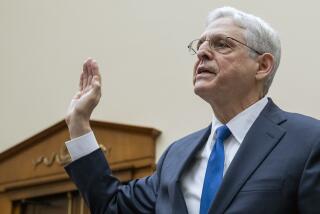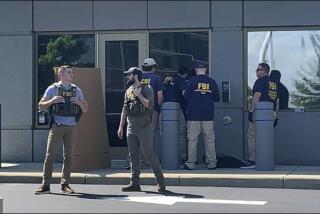Clinton Defends Agents’ Efforts in Waco Siege
- Share via
WASHINGTON — President Clinton, seeking to align himself squarely with law enforcement, Thursday denounced the “depravity” of slain Branch Davidian leader David Koresh and accused congressional Republicans of irresponsibly suggesting that federal officers “are some sort of armed bureaucracy acting on private grudges and hidden agendas.”
As congressional hearings on the fatal siege moved into their second day, Clinton acknowledged that the final word is not yet in on federal agents’ actions in the 1993 raid on the cultists’ compound near Waco, Tex., and the 51-day siege that followed.
Referring to Wednesday’s testimony of a teen-ager who said that she was forced to have sex with Koresh as a 10-year-old, Clinton asserted that there is “no moral equivalency between the disgusting acts which took place inside that compound in Waco and the efforts that law enforcement officers made to enforce the law and protect innocent people.”
“This country needs to be able to make that distinction, and not to forget it,” Clinton said, speaking at a meeting with top federal law enforcement officials.
“We must not make war against police.”
His blunt speech a day after the teen-ager’s testimony appeared to be an effort to tilt the public relations battle over the raid in the Administration’s direction and to bore in again with a pro-police position of the kind that helped give him a monthlong boost in the polls after the April 19 Oklahoma City bombing. As Clinton has tried to move to the political center this year, he has repeatedly appeared with police groups and sought to identify himself with their interests and crime-fighting efforts.
*
But the President’s position on Waco is not without risks, analysts say. They point out that he may find himself vulnerable if new revelations from the hearings deepen public doubts about the federal agents and the tactics that they used to storm the compound. If that happens, his outspokenness may tie him in the public mind more closely to the bungled raid.
Clinton made his remarks to senior officials of agencies that have been surprised and demoralized by continuing controversy over a series of incidents that have cast federal law enforcement in a bad light.
These include the Waco raid, a recent picnic in Tennessee with allegedly racist overtones that was attended by some federal agents and accusations of document tampering in an investigation of an FBI gun battle with a white separatist at Ruby Ridge, Ida.
Among those present for the remarks were Atty. Gen. Janet Reno; Treasury Secretary Robert E. Rubin; Deputy Director Daniel R. Black of Treasury’s Bureau of Alcohol, Tobacco and Firearms; Acting Deputy Director Bill Esposito of the FBI and Marshals Service Director Eduardo Gonzales.
Clinton recalled that, after the Oklahoma City bombing, some people wore T-shirts that depicted the activities of federal law enforcement, above the caption: “A society that makes war against its police better learn to make friends with criminals.”
“That’s a fact,” Clinton said.
“It is irresponsible for people in elected positions to suggest that the police are some sort of armed bureaucracy, acting on private grudges and hidden agendas. That is wrong. It’s inaccurate. And people who suggest that ought to be ashamed of themselves.”
He said that, as in any field, there are “all kinds of people” in law enforcement and that some make mistakes. When they err, he said, “they ought to be held accountable.”
Critics of the Branch Davidian siege, which ended with the deaths of more than 80 sect members and four law enforcement officers, have argued that Koresh did not deserve his fate, however misguided or even criminal his actions. They have said that FBI and Treasury agents could have found other ways to intervene without the bloody assault and pointed to apparent corner-cutting in the government’s application for a search warrant.
But Clinton sought to pound home what he saw as the full extent of Koresh’s errors.
The first day of testimony by two House subcommittees “was a sad and painful reminder of the depravity that took place inside that compound and the fact which confronted the President, the attorney general and the federal law enforcement officials at the time,” he said.
“Here was a man who was molesting young girls and paddling children with boat oars; a man who was laying up supplies and illegal weapons for Armageddon; a man who was instructing women and children about how to commit suicide; a man who took the trust of young children and twisted it, who told people that if they wanted to do the will of God they had to be willing to kill for God.”
Clinton said that his Administration had made an “exhaustive study” of the case, and dismissed people as a result. He also noted that congressional hearings were conducted in 1993, though he conceded that--if the GOP-guided Congress wants to hold new hearings--”that is their right.”
But he insisted: “I think it’s important to get the facts here quite clear.”
The White House also weighed in strongly on the side of congressional Democrats who have demanded hearings on what they allege has been the hidden role of the National Rifle Assn. in inspiring and organizing the hearings.
Times staff writer Ronald J. Ostrow contributed to this story.
* WHY RAID FAILED: Experts say faulty intelligence led to failed Waco raid. A17
More to Read
Sign up for Essential California
The most important California stories and recommendations in your inbox every morning.
You may occasionally receive promotional content from the Los Angeles Times.














